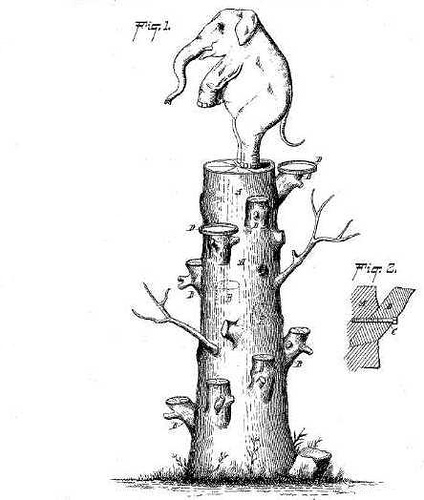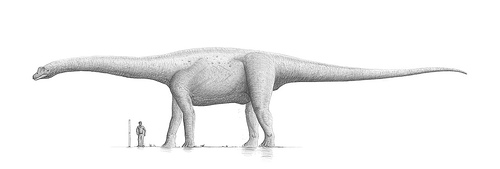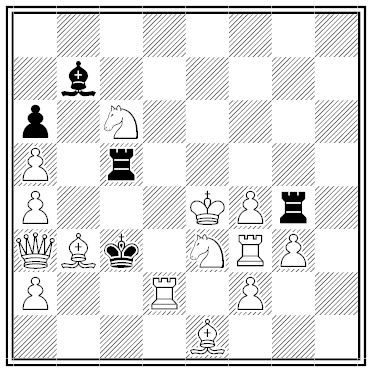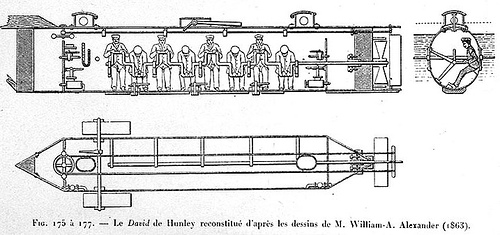
In 1891, Hermann Reiche patented a platform “to enable an elephant to climb up a tree.”
“Doubt,” wrote Galileo, “is the father of invention.”

In 1891, Hermann Reiche patented a platform “to enable an elephant to climb up a tree.”
“Doubt,” wrote Galileo, “is the father of invention.”
Excerpts from the log of J.E. Duane, a weather observer at Long Key, Fla., when the most intense hurricane in U.S. history made landfall on Sept. 2, 1935:
9:20 p.m. I put my flashlight out to sea and could see walls of water which seemed many feet high. I had to race fast to regain the entrance of the cottage, but water caught me waist deep, although writer was only about 60 feet from doorway of cottage. Water lifted cottage from foundations and it floated.
10:15 p.m. The first blast from SSW, full force. House breaking up — wind seemed stronger than any time during storm. I glanced at barometer which read 26.98 inches, dropped it in the water and was blown outside into sea; got hung up in broken fronds of coconut tree and hung on for dear life. I was struck by some object and knocked unconscious.
Later: “2:25 a.m. I became conscious in tree and found I was lodged about 20 feet above ground.”
You’re in a rowboat in a swimming pool, and you’re holding a cannonball. If you throw the ball into the pool, will the water level rise or fall?

In 1989, paleontologists discovered the fragmentary remains of an enormous dinosaur in southern India.
If estimates are accurate, Bruhathkayosaurus was 145 feet long and weighed 240 tons.
The largest modern whale is 110 feet long and weighs 195 tons.
The following bill was sent to a gentleman:
aosafada: 1.50
atacinonimomagin: .50
Pade, Josef Jaxn: 2.00The items of that bill are not apothecaries’ articles, as might be supposed; but merely, ‘A horse half a day and a taking of him home again.’
— George Wakeman, “Tormenting the Alphabet,” Galaxy, 1866
John Cazale is not a household name, but he should be. When the actor died at age 42, he’d made only five films, but every one of them was nominated for best picture:
That alone would have made him unique in Hollywood history, but he added a hat trick. In 1990, 12 years after his death, Francis Ford Coppola used archive footage to include Cazale in The Godfather Part III (as Fredo Corleone).
That too was nominated for best picture.

In this position, composed by Harold Holgate Cross, White has 29 legal moves. What do they all have in common?
agrexophrenia
n. inability to perform sexually due to fear of being overheard
32 + 42 = 52
212 + 222 + 232 + 242 = 252 + 262 + 272

The Confederate navy had a working submarine during the Civil War. Powered by a hand crank, the 40-foot H.L. Hunley managed to sink an 1,800-ton sloop-of-war in Charleston harbor in 1864, a historic first, but then herself sank.
Little is known about the sub’s crew, but one story held that the commander, Lt. George E. Dixon, had survived the Battle of Shiloh because a Union bullet struck a coin in his pocket. His sweetheart, it was said, had given him the coin “for protection.” This was considered a family legend until 2002, when a forensic anthropologist investigating the Hunley‘s remains discovered a healed injury to Dixon’s hip bone.
Near Dixon’s station another researcher found a misshapen $20 gold piece, minted in 1860, with this inscription:
Shiloh
April 6 1862
My life Preserver
G. E. D.